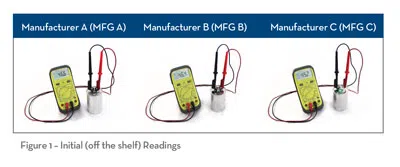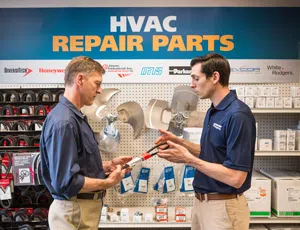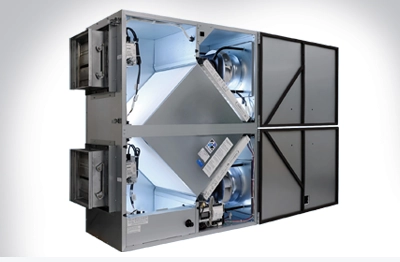Don’t sacrifice your company’s reputation when saving money
Chances are good that you’ve examined every possible aspect of your business for ways to become more economically efficient and reduce expenses. Every means of cost-containment should be investigated during a challenging economy, but don’t fall into the trap of compromising on quality in order to save some money.
Over the past several years, a common victim to cost-cutting strategies has been the motor run capacitor. Although a relatively inexpensive component, it is an essential part in every HVAC system. Saving a couple dollars when buying cheaper capacitors may seem like a logical move, but can actually lead to extensive warranty claims, call-backs and damage to your reputation.
What does the capacitor do?
A capacitor can be considered similar to an everyday battery; they both store energy, but release it very differently. A battery has a limited amount of stored electrical energy that is released slowly, while a capacitor stores and releases energy at a much more rapid pace, often in seconds or less. Every Permanent Split Capacitor (PSC) motor in an HVAC system is furnished with a motor run capacitor. The motor run capacitor is designed for continuous duty and supports the blower motor, the condenser fan motor and/or the compressor of an HVAC system by bringing the motor to a higher efficiency.
Assessing capacitors
Testing performed on various manufacturers’ capacitors reveals that nearly all new capacitors perform the same off the shelf. The capacitors in Figure 1 were tested right out of the box using a TPI 135 Digital Multimeter. All three readings fall within the 45uF +/-6% tolerance. A capacitor is considered passing if it has a microfarad reading between 42.3uF and 47.7uF. As shown in Figure 1, all of the capacitors meet the criteria. Unfortunately, capacitance on a new capacitor does not provide an indication of long-term reliability, but the industry standard, EIA-456-A, can.
Figure 1.

The Electronic Industries Alliance (EIA) issues quality standards for capacitors. EIA-456-A is the standard for metalized film dielectric capacitors intended for use with, among other things, AC motors. EIA outlines an accelerated life test for capacitors that subjects them to 125% of their rated voltage and 10oC above their rated temperature for 2,000 hours, simulating 60,000 hours of field life.
If you estimated a capacitor’s operational time to be 5,000 hours per year, then a 60,000 hour capacitor could last approximately 12 years in the field. Many HVAC manufacturers adhere to EIA standards and thus require capacitors that meet EIA-456-A.
Figure 1 illustrates that, when tested, three capacitors from different manufacturers yielded a reading that is consistent with the rating stated on their labels. Based upon these initial readings, it would seem that all three units are good capacitors. However, it’s in the rigorous EIA-456-A testing that capacitor quality can be verified.
Quality Products and Warranty Costs
For purposes of modeling, the following example assumes that a manufacturer’s warranty period covers both parts and labor in the first year. After the first year, only the parts are covered and the labor would be absorbed by the contractor. The three capacitors shown in Figure 1 were tested to the EIA-456-A standard. Listed below are the test results for each capacitor for one, five and ten years of simulated field reliability. As previously mentioned, a capacitor’s estimated operational time per year is 5,000 hours.
Figure 2.

Figure 2 demonstrates that, over time, the capacitor failure rate begins to increase depending on the manufacturer. After an estimated five years in the field, one manufacturer had zero failures, one had significant failures, and the third only had one failure. With only one failure, Figure 3 demonstrates the very real effects that a 10% failure rate has on a company’s bottom line.
Figure 3.

Figure 3 shows the potential costs involved with capacitor failures on a purchase of 500 units from three different manufacturers. Based on the testing conducted, the data provides the long term / warranty results for each manufacturer and demonstrates the true Total Cost of Ownership for a business.
Figure 3 shows that even though Manufacturer C has a minimal 10% failure rate after five years in the field, it will cost a business roughly $3,500 in warranty costs. In addition to price and warranty cost, there is also the lost potential when technicians are spending time on repeating service calls.
As Figure 3 demonstrates, higher priced capacitors will cost more up front, but what is being purchased is quality and reliability. Many cheaper capacitors degrade quickly and can cost a business thousands of dollars in labor on warranty claims, not to mention the damage to your reputation.
Isn’t your reputation worth more than saving $2 on a part?
Total Cost of Ownership for the contractor hinges on the quality of the product. You may be able to save $2 by purchasing a less expensive capacitor, but the warranty costs will eventually surpass the higher upfront cost due to poor reliability from inferior products. Even though the manufacturer will replace damaged parts under warranty, it is ultimately your reputation that is being damaged each time you replace a faulty capacitor.
The key thing to remember is that all capacitors are going to test well out of the box, but it’s the lifespan of the capacitor that matters. Before purchasing capacitor products, do your homework by questioning manufacturers about how their products compare to the EIA-456-A industry standard. Do not be afraid to ask the manufacturers for their capabilities for reliability testing. Any reputable manufacturer will be able to discuss this with you. From this, you will be able to assess the quality of the capacitor product yourself.
Anthony (AJ) Colone III is the capacitors product manager for Genteq, a division of Regal-Beloit Corp. He has helped launch six new capacitor products in the last 10 years, and has advised and educated hundreds of contractors, wholesalers, and other distributors on capacitor quality issues. Colone is a certified Green Belt in Lean Six Sigma and has authored numerous trade articles on the topic. Contact him directly with capacitor questions atanthony.colone@regalbeloit.com. For more information, visit www.thecapacitortoolbox.com.








